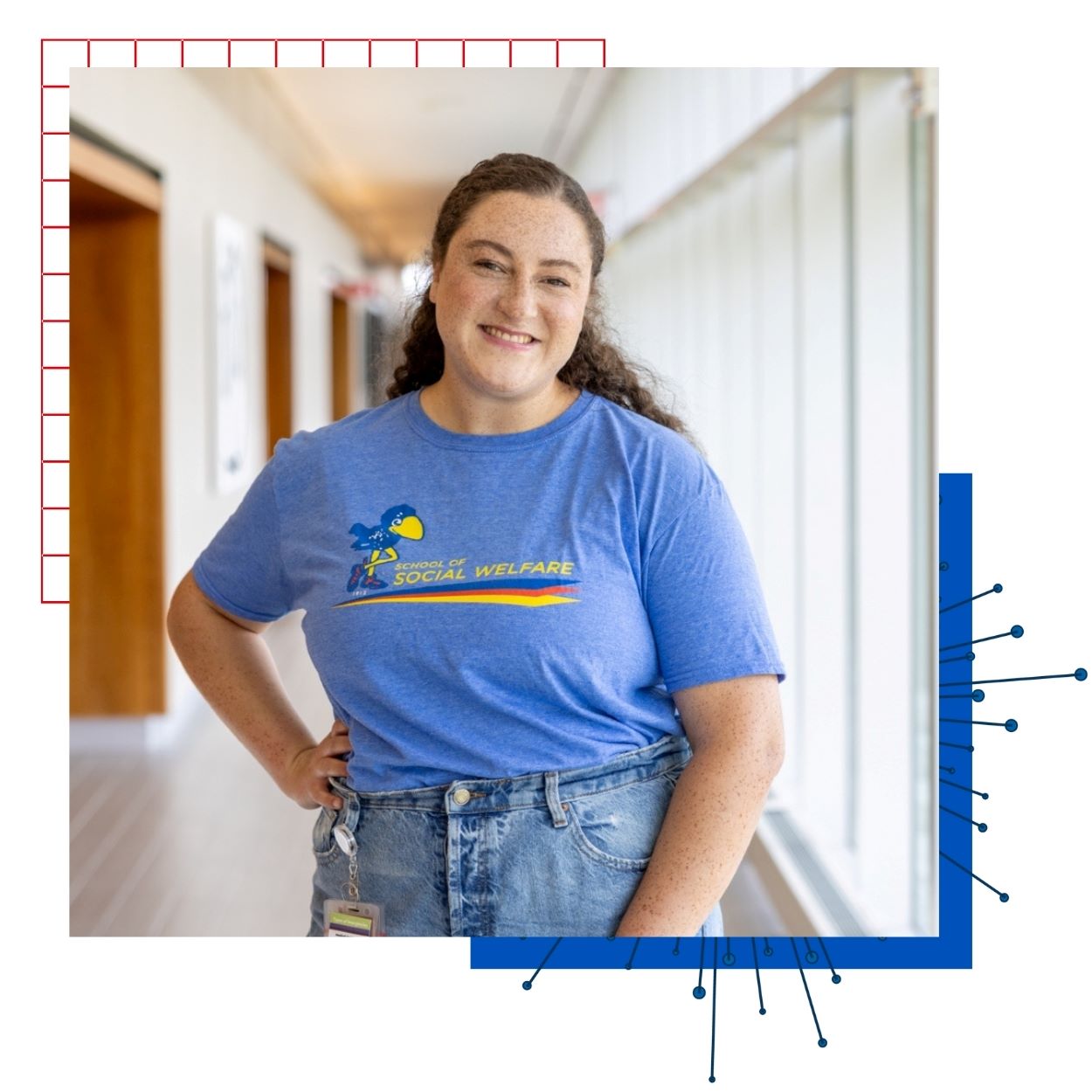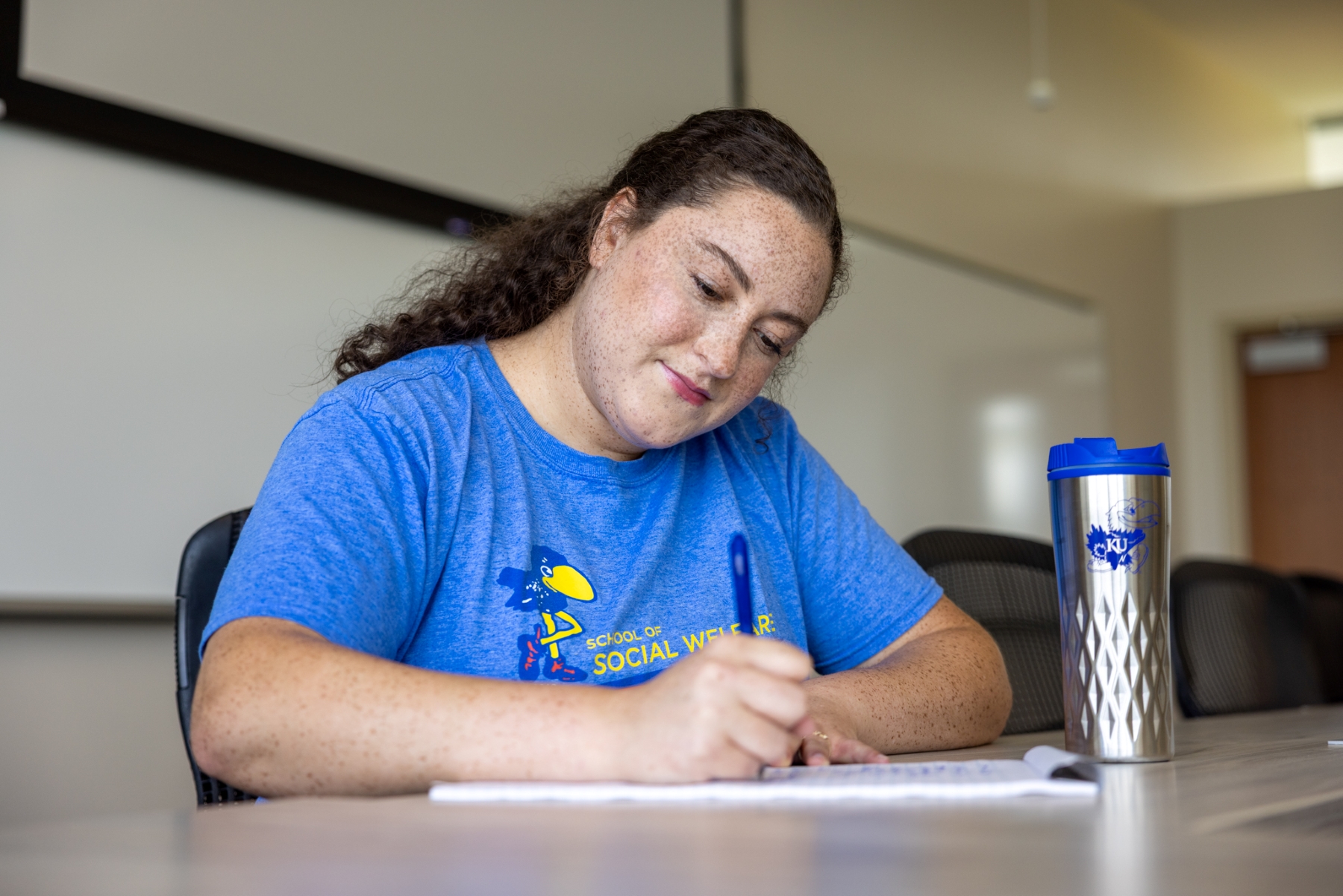What can you do with a social work degree?
Explore Social Work Careers and KU’s Five-Year MSW Path

Social work is a field that blends compassion, problem-solving and leadership. People facing life’s challenges can rely on social workers to help them navigate complex systems and find hope in difficult times. For those who want to make a difference in people’s lives, social work jobs can be an excellent fit.
At the University of Kansas, the unique five-year Master of Social Work program allows students to earn both a bachelor’s and a master’s degree in social work. This fast-track option creates a clear path to an incredible variety of rewarding careers.
We sat down with three MSW alumni to learn how this popular program shaped their careers. From clinical social work to advocacy and beyond, they shared how the program opened doors to new opportunities and supported their unique career journeys.
What is social work?
This field is often referred to as both a profession and a calling. It centers on helping people improve their well-being and navigate the challenges that life throws at them. Practitioners are trained to listen, advocate and guide, working in schools, hospitals, mental health clinics and countless other settings.
But the field goes beyond direct service to clients. It also involves addressing the systems and policies that shape communities. Social workers advocate for fairness and strive to ensure everyone has access to resources and opportunities.
MSW alumni Carlie Seifert shared that the field’s wide range of opportunities draws in people who are curious about many aspects of helping others.
“I was interested in so many different facets of the helping professions. I was really interested in mental health, but I was also really interested in social justice issues, and more of those broader issues that aren't as easy to solve through therapy or going to the doctor. Social work for me is very all-encompassing. I just knew I had so many career options, too, in the future.”
Carlie Seifert, Social Work Case Manager at The University of Kansas Health System Addiction Clinic
How are social work and psychology different?
When incoming KU students consider their options for undergraduate degrees, they often compare psychology and social work.
Psychology and social work are both client-focused fields that aim to support people and improve their lives. The main difference lies in how they approach that goal. A psychology degree dives deep into understanding how people think, feel and act. It often involves studying theories and research about the brain and behavior and applying that knowledge to help clients through therapy or counseling.
In contrast, social work focuses more on connecting people with resources and support systems. Social workers help clients navigate challenges in their lives, like housing, employment or family issues, and they advocate for social change in communities. Both paths share a passion for helping others, but the focus and day-to-day work can be quite different.
As an open access clinician with Johnson County Mental Health Center, Sydnee Bradley works with walk-in clients to help determine needs, risk factors and appropriate resources. She shared that choosing a degree in social work helped her see the full picture.
“On the social work side, what I really appreciate about it is that we are looking not only at just mental health symptoms or just the therapy progress. Our goal is to be a wraparound service. We're looking at not only their mental health, but their family systems and how they're doing within their environments.”

MSW alumna Carley Sherer, who serves as an embedded clinician through KU’s Counseling and Psychological Services (CAPS), agreed.
One of the biggest takeaways from the master's program that makes social work unique to different mental health fields is the focus on social justice and advocacy. There's a focus on systematic issues and how that can impact a client. You learn to see a person through a strengths-based lens; to view not only the individual and the way they think, but the environment they exist in and how that impacts their experience in the world. It teaches you to think about what barriers there are to care and value making services equitable.”
What jobs can you get with a social work degree?
A social work degree opens doors to a world of possibilities. Social work jobs span many areas, including schools, hospitals and community agencies. The careers you can pursue depend on your passions and interests.
For example, some KU alumni work as school social workers. They support students and families, helping them navigate challenges in the classroom and at home. Others work as case managers in hospitals or mental health settings, connecting people to resources that meet their needs.
Bradley shared that the opportunities for social worker positions are so much more varied than people might realize.
“Not only can you work as a clinician in a crisis clinic, you can work at a hospital as a social worker. You can work in a school system with kiddos in elementary school through high school. You can work with veterans, or I know of social workers that work in prisons with inmates and even reintegration. The list goes on,” she shared. “There are so many different places you can end up as a social worker, because the goal is truly to support clients in their own care and treatment, and being there for them, no matter what.”
Other jobs you can get with a social work degree include roles in child welfare, substance use treatment and even sports social work, a growing field that helps athletes navigate mental health challenges and life transitions.
Social workers often support children and families navigating foster care, or help adults manage crises or cope with mental health challenges. There are roles aimed at assisting elderly individuals in daily life, as well as supporting families in hospice care. They help people and families navigate every stage of life.

What jobs can you get with a master’s in social work?
An MSW is a graduate degree that can help you take on more responsibility and pursue clinical roles. Many MSW careers involve providing therapy and other mental health services. Others focus on community leadership or policy change.
With an MSW, you can become a licensed clinical social worker. This credential allows you to provide mental health counseling, open a private practice or supervise other social workers. MSW careers can include pathways such as program directors, policy analysts and nonprofit leaders.
After earning an MSW, many graduates find themselves in positions where they can lead, advocate and make change. Some social workers choose to specialize in clinical work, providing therapy and counseling to individuals and families. Others move into administration or policy work, shaping the future of social services in their communities.
Seifert said that her graduate studies gave her the confidence to take on bigger challenges.
“In grad school, I learned a lot of clinical modalities for therapeutic services. I've been able to use many of those, and I've been able to continue my education inside my role, which has been great,” she said. “We also learned a lot about different systems and how they work, especially working in the healthcare system. After learning about different theories and systemic challenges in social work, being able to see these things come to life has been amazing.”
The MSW also prepares graduates to work across different systems. Whether you want to address housing challenges, advocate for children or work on substance use policy, an MSW gives you the tools to make a difference.
Seifert loves that the opportunities for growth are so plentiful. “I'm a case manager, but I am also working on my clinical license. I get to provide therapy, and I also help manage grants here, so I already get to dip my toes into a little bit of policy and grant management too.”
Some of the most common MSW careers include:
- Licensed clinical social worker
- School social worker
- Medical social worker
- Substance use counselor
- Community outreach specialist
- Policy advocate
- Nonprofit program director
- Hospice social worker
- Researcher
- Grant writer or fundraiser

Rewarding social work jobs
One of the best parts of social work is that you can focus your career on your interests and the communities you want to support. Some graduates find the greatest fulfillment in working with children in schools, while others prefer working in hospitals or clinics. Many social workers love the chance to see people grow and overcome challenges.
In her role with KU’s CAPS, Sherer works with social work and law school students on campus. She shared how excited she was to find a position that aligns with her personal values and goals.
“It’s great to be in a role where there is a lot of support and work life balance. Since embedded clinicians are new on the KU campus, there's a lot of room for creativity and introducing new ideas that the CAPS staff is really open to, so continuing to build on that is exciting. Having something that I'm passionate about outside of work also become my job that I enjoy is so important to me. I spend so much time of my week doing this, and it still feels like I'm living with my personal values, even inside my work.”
Social work jobs can be demanding, but they are also deeply rewarding. Practitioners see the impact of their efforts every day, whether that is supporting college students through stressful times, helping someone find stable housing or guiding a family through a health crisis.
Spotlight on KU’s Five-Year MSW Program
KU offers a Bachelor of Social Work degree as well as a Master of Social Work, but many students choose the 5-year master’s track, which combines undergraduate and graduate coursework to help them complete a Master of Social Work degree sooner.
Bradley shared that the 5-year master’s program made her decision to study at KU an easy one. “It's somewhat expected to consider the master’s degree in this field, just because that's what expands a lot of therapy opportunities and a lot of clinician type roles,” she noted. “That's what I was looking for, specifically. I knew I'd have to complete my bachelor's in social work to get to the master’s, and KU offered both. That was a very convenient spot to be.”
This unique program combines classroom learning with fieldwork in real social work settings. From the start, students are paired with agencies where they gain practical experience and build the skills they need to succeed. In both the undergraduate and graduate terms of KU’s social program, students are required to complete a practicum.
Seifert said her practicum gave her the chance to experience social work in a variety of settings. She never felt locked into a specific pathway — in fact, quite the opposite.
“At KU, you will do a practicum, which is your yearlong internship that you do with a state social services program. It’s a really great opportunity for students to dip their toes in the water and see what they like. They can test out working with kids or working with adults, working in addictions, working for government agencies and more. The best part is your choice doesn't necessarily affect what you want to do after. For example, both of my practicums were working with kids, and now I'm working with adults and addiction.”

Skills and Connections for Life
The growth that comes from KU’s program is vast, and it’s about more than gaining skills and in-depth experience. It’s also about relationships built inside the program with faculty and classmates alike.
Bradley emphasized that the support she found from faculty made a profound impact.
“Your professors at KU are truly the biggest sources of knowledge. They are people that have practiced and researched in the field, who have the same values as you. You are well taken care of by the faculty here, and because many of them are social workers, a lot of them are so passionate about mental health and taking care of yourself in the education process, and that was what I loved about our program. It's truly just this living, breathing community that is supporting you in your work as you move forward.”
Sherer also praised the connections she formed in the program and advised future students to nurture those relationships.
“Reaching out and asking for help or just getting connected with people is my best advice. I still get coffee every couple of months with one of my undergrad professors, and we don't even work in the same kind of role now,” she shared. “But the faculty really cares, and I think people in this field just want to build connections with each other. I think that's something that's special to the program — the personal relationships.”